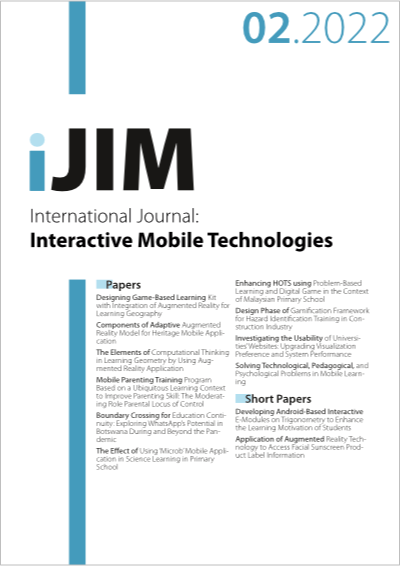Developing Android-Based Interactive E-Modules on Trigonometry to Enhance the Learning Motivation of Students
DOI:
https://doi.org/10.3991/ijim.v16i02.27503Keywords:
android-based interactive e-modules, trigonometricsAbstract
The development of technology is growing very rapidly, then it should be used for improving many important aspects of our daily life, such as learning innovation. This study aims to develop an android-based interactive e-module on trigonometries’ topic to enhance the learning motivation of students. The topic of trigonometry is chosen because it lacks to be discussed. Many Android-based interactive e-modules are generally limited on numbers. On the other hand, online learning policies during pandemics make many students feel bored, one of which is because the learning applied by the learning media or methods chosen by teachers is monotonous and less attractive. The contents of this e-module consist of learning outcomes, material descriptions, learning videos, and quizzes. The method in this study is Research and Development with the ADDIE model. The ADDIE model has five stages: Analyze, Design, Development, Implementation, and Evaluation. The main key in this method is the iteration process. Before the trial, the e-module is validated by substantial experts and learning media’s experts. The substantial experts gave a score of 4.32 out of 5 which indicates the modules are valid substantially. The learning media’s expert gave a score of 4.18 out of 5 which indicates the modules are very valid. Then, these e-modules are implemented into small classes and large classes. The practicality and the effectiveness of these e-modules are measured. The practicality of these e-modules in the small class has a score 4.18 out of 5, while it has a score of 4.28 out of 5 in the large class. The effectiveness of this e-modules in small class have score 4.28 out of 5, while it has score 4.31 out of 5 in a large class. These results indicate that android-based interactive e-modules are effective and recommended to be used in the teaching-learning process on trigonometry.
The development of technology is growing very rapidly, then it should be used for improving many important aspects of our daily life, such as learning innovation. This study aims to develop an android-based interactive e-module on trigonometries’ topic to enhance the learning motivation of students. The topic of trigonometry is chosen because it lacks to be discussed. Many android-based interactive e-modules are generally limited on numbers. On the other hand, online learning policies during pandemic make many students feel bored, one of which is because the learning applied by the learning media or methods chosen by teachers is monotonous and less attractive. The contents of this e-module consist of learning outcomes, material descriptions, learning videos, and quizzes. The method in this study is Research and Development with the ADDIE model. The ADDIE model has five stages: Analyze, Design, Development, Implementation, and Evaluation. The main key in this method is the iteration process. Before the trial, the e-module is validated by substancial experts and learning media’s experts. The substancial experts gave a score 4.32 out of 5 which indicates the modules are valid substancially. The learning media’s expert gave a score 4.18 out of 5 which indicates the modules are very valid. Then, this e-modules is implemented into small class and large class. The practicality and the effectiveness of this e-modules are measured. The practicality of this e-modues in the small class have score 4.18 out of 5, while it have score 4.28 out of 5 in the large class. The effectiveness of this e-modules in small class have score 4.28 out of 5, while it have score 4.31 out of 5 in large class. These results indicate that android-based interactive e-modules are effective and recommended to be used in teaching-learning process on trigonometry.
Downloads
Published
How to Cite
Issue
Section
License
Copyright (c) 2021 Asmianto Asmianto, Kridha Pusawidjayanti, Mochammad Hafiizh, Desi Rahmadani, Sapti Wahyuningsih

This work is licensed under a Creative Commons Attribution 4.0 International License.



